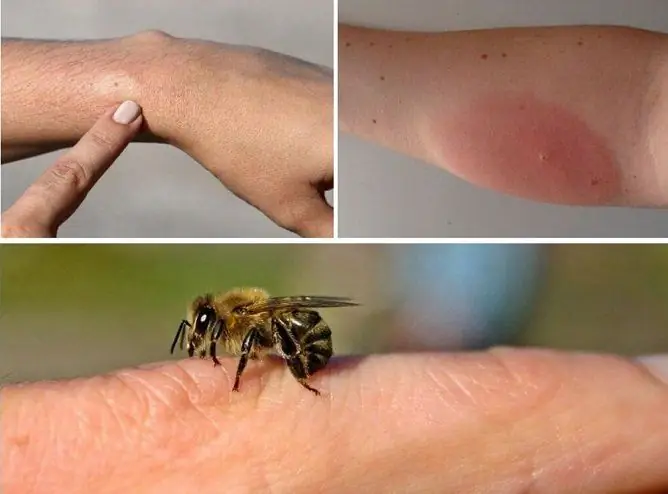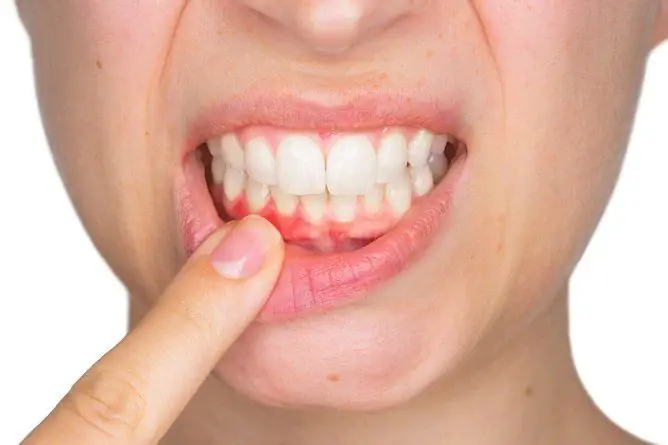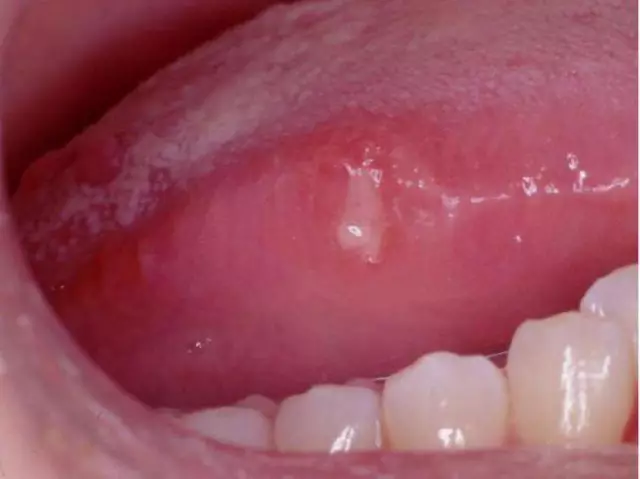- Author Rachel Wainwright wainwright@abchealthonline.com.
- Public 2024-01-15 19:51.
- Last modified 2025-11-02 20:14.
Tongue swells: causes, treatment
The content of the article:
-
Causes of tongue edema
Acute trauma
- Infectious inflammation
-
Chronic damage
- Other diseases
- Quincke's edema
-
Treatment
- What to do at home
- Emergency care for Quincke's edema
- Treatment depending on the cause
- Video
The tongue swells for various reasons, ranging from a burn with hot food, ending with a severe allergic disease - angioedema. You can provide first aid and reduce symptoms at home, but see your doctor afterwards.

Swelling of the tongue can be caused by both local and general causes.
Causes of tongue edema
Language has long been considered an indicator of human health. Any irregularities, such as the appearance of tooth marks on the lateral surfaces, discoloration and size, soreness, may indicate health problems. Edema is no exception. An organ can swell for various reasons: trauma, allergies, infection, endocrine diseases. Determining the cause is important for further treatment.
Acute trauma
The most common reason why the tongue swells is its thermal, chemical or mechanical damage. Thermal damage can occur when eating too hot food, chemical damage when drinking strong alcoholic beverages. At the same time, only the oral cavity is affected (less often the esophagus is also), in addition to edema, other symptoms occur: pain, which is especially troubling during meals, numbness, tingling.
Mechanical damage often occurs, for example:
- as a result of biting the mucous membrane while eating, an attack of epilepsy;
- when filling teeth;
- when the mucous membrane is injured with a knife, fork, bone.
Edema and hyperemia with such a lesion usually persists for 2-3 days. Deep wounds increase the risk of infection.
Infectious inflammation
Edema may indicate acute infectious glossitis. Glossitis is a condition characterized by inflammation of the tongue. Acute glossitis is characterized by the following symptoms:
- swelling;
- soreness;
- hyperemia;
- local temperature rise.
The cause of glossitis can be various microorganisms - bacteria, viruses, fungi.
Chronic damage
Long-term exposure to traumatic factors leads to the development of chronic glossitis. Chronic glossitis is caused mainly by the following factors:
- carious teeth;
- poor quality fillings and prostheses;
- tartar;
- bad habits.
The process develops for a long time - for months, years. There is swelling, hyperemia, soreness. Erosions and ulcers may form over time.
Other diseases
Often, swelling of the tongue is one of the signs of diseases of the internal organs.
| Group of diseases | Explanation |
| Diseases of the thyroid gland | Tongue swelling and swelling can be signs of hypothyroidism. Symptoms are due to the buildup of mucopolysaccharides that retain water. |
| Pathology of the stomach and intestines | Diseases of the gastrointestinal tract are often accompanied by damage to the oral cavity. The tongue may swell, prints appear on its lateral surface. |
| Vitamin deficiency | Especially often the symptom appears with a deficiency of B vitamins (B1, B12). |
Quincke's edema
Quincke's edema is an acute allergic condition in which areas with well-developed subcutaneous tissue swell. These are the oral cavity, face, neck, genitals. Edema can affect the entire facial area, but it can develop in isolation, for example, when only the tongue is swollen.
An allergic reaction occurs in response to the action of an allergen, which can be:
- food products (especially citrus fruits, honey, chocolate, nuts);
- plants;
- medications;
- insect venom.
- Symptoms develop quickly, within a few minutes after exposure to an allergen:
- the tongue increases significantly in size;
- the surrounding tissues swell;
- difficulty breathing;
- aphonia (loss of voice) occurs.
Treatment
In the treatment of pathology, an integrated approach is used. At home, you can use rinsing with antiseptics or decoctions of medicinal herbs, follow a diet. After identifying the cause, the doctor prescribes specific medication.
What to do at home
The main thing that is used at home is rinsing. It is necessary to rinse your mouth with plain water every time after eating, as the accumulation of food debris in the swollen tissue can lead to infection.
Additionally, rinses with medications and folk remedies are used. The following solutions have an antiseptic effect:
- Chlorhexidine;
- Furacilin;
- decoction of chamomile;
- decoction of calendula.
To reduce puffiness, antihistamines can be used, for example, Loratadin, Suprastin. With severe pain, local anesthetic drugs are prescribed: Pyromecaine ointment, Bumecaine solution.

In case of infectious inflammation, the swollen tongue can be treated with Chlorhexidine
Emergency care for Quincke's edema
The first thing to do is to stop contact with the allergen that caused the edema (cancel the administration of the drug, stop eating, eliminate the insect).
If possible, you need to slow down the absorption of the allergen:
- with an insect bite, apply a tourniquet above this place;
- with intramuscular injection of the causative drug, apply a cold compress or ice.
The following actions are aimed at relieving the victim's breathing. Unbutton tight clothing and provide fresh air.
In addition, be sure to call an ambulance and follow the instructions of the medical staff.
Treatment depending on the cause
Further treatment depends on the cause of the edema.
| Cause | Treatment tactics |
| Acute trauma | It is recommended to apply ice or cold compress immediately after injury. Specific treatment is usually not required, it is enough to use rinsing with antiseptics, follow a sparing diet. When needed, non-steroidal anti-inflammatory drugs (NSAIDs) are used to reduce pain and inflammation. |
| Infectious lesion | Antibacterial, antiviral, or antifungal drugs are used. |
| Chronic damage | Treatment consists in eliminating the influence of the damaging factor and sanitation of the oral cavity. |
| Angioedema |
Medication is used to eliminate edema. Adrenaline is injected subcutaneously to normalize the cardiovascular system. Also used are glucocorticoids - Dexamethasone, Prednisolone, these drugs have a strong anti-allergenic and anti-edema effect. Additionally, antihistamines (Diphenhydramine, Loratadin) and diuretics (Furosemide) can be used. |
| Internal diseases |
The underlying disease should be treated. In case of diseases of the stomach and intestines, it is necessary to follow a diet, antacids, proton pump inhibitors, and probiotics are often prescribed. With hypothyroidism, hormone replacement therapy is prescribed - Levothyroxine. With hypovitaminosis, B vitamins are prescribed. |
Video
We offer for viewing a video on the topic of the article.

Anna Kozlova Medical journalist About the author
Education: Rostov State Medical University, specialty "General Medicine".
Found a mistake in the text? Select it and press Ctrl + Enter.






